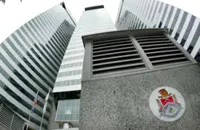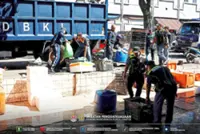DBKL: Stick to guidelines on licences, breeds and keeping animals in strata properties
DOG owners in Kuala Lumpur take note – as of April 1, the licence fee for their pets has increased to RM60 per animal.
The fivefold increase in the fee is the first in over 20 years by Kuala Lumpur City Hall (DBKL). Previously, the annual fee for a dog licence stood at RM10.
Dog owners who have neutered or spayed their pets will have one benefit – this fee goes down to RM40 and RM20 for small dogs.

DBKL public health unit director Dr Shariza Natasha Hasiri said the fee adjustment was aimed at promoting responsible dog ownership among city folk.
“We hope the public will take advantage of the reduced fee by having their pets neutered,” she told StarMetro.
ALSO READ: Strata residents raise issue of cohabitation with pets
In the event of your pet running away and ending up in the city pound, she said DBKL or the dog owner would be able to trace their beloved pets via the licence registration numbers.
DBKL allocated about RM700,000 every two years to manage various aspects of the dog population, including dog food, stray capture and cremation fees, she added.
Dr Shariza also said the stray population increased rapidly with more people abandoning their dogs.

Those feeding stray animals also indirectly contributed to the increase in their population, she added.
“Dog ownership in Kuala Lumpur is regulated by the UUK 2011 (Undang Undang Kecil), Dog Licensing, and Kennel Establishment By-laws (Federal Territory of Kuala Lumpur 1991), which outlines dog ownership guidelines in landed and stratified properties.
“There are guidelines for various categories of dogs, including restricted dogs, small dogs and special breeds.
“For instance, certain breeds fall under the ‘restricted’ category, necessitating additional conditions and documentation to obtain a licence,” said Dr Shariza.
Restricted, prohibited breeds
Restricted breeds are classified as controlled, including the Rottweiler, Doberman, German Shepherd, Belgian Shepherd, East European Shepherd, Bullmastiff, Bull Terrier and Canary Dog.
DBKL assistant environmental health officer Om Prakash Karunakaran said owners of restricted breeds applying for licence must first demonstrate that their pet had completed an obedience training course conducted by an organisation certified and approved by City Hall.
“These breeds, while undoubtedly adorable, often require obedience training and participation in Canine Good Citizen (CGC) programme to promote responsible dog ownership.
“In this programme, both the dog and its owner/handler must undergo a brief behavioural assessment,” said Om Prakash.
“This training is crucial due to the strong-willed and occasionally dominant nature of these breeds.
“If left untrained in socialising with other dogs and humans, they may display behaviours such as aggression, territorialism and dominance, posing risks to both animals and humans alike,” he said.
Om Prakash added that obedience training helped such breeds develop appropriate behaviour, respond to commands and become well-behaved companions.
DBKL’s by-laws explicitly prohibit the ownership of pets classified as prohibited breeds due to their perceived aggression, potential danger to the public or past history of attacks.
These include the Pit Bull Terrier (also known as the American Bulldog), Neapolitan Mastiff, Japanese Tosa, Akita, Dogo Argentino and Fila Brasileiro.
“These dogs are known for their unpredictable behaviour and emotional nature. No licence will be issued for their ownership.
“Those who choose to own such breeds must accept the consequences of their decision in the event of any incident,” said Om Prakash.
Stratified properties
Dog ownership in strata properties such as condominiums, flats or apartments is governed by the Strata Management Act.
There is no prohibition on the keeping of dogs, but it is subject to the animals not being a nuisance or health risk, and owners complying with respective local authority laws or by-laws.
Under DBKL’s by-laws, only small breeds are permitted and each unit is allowed to have only one dog.
“To obtain a licence, applicants must include a consent letter from the management corporation (MC) or joint management body (JMB),” said Dr Shariza.
She noted that small breeds eligible for ownership included the Chihuahua, Poodle, Maltese, Pekingese and Papillon.
While some MCs or JMBs permitted pets in their buildings, others have banned them altogether or have regulated pet ownership through house rules.

Some might even impose fines on owners who violated regulations, she added.
“In the event of a dispute between dog owner and management, the management’s decisions take precedence because our licence guidelines are tied to the management giving permission,” Dr Shariza said.
Om Prakash said the restrictions were put in place through the respective development’s house rules.
“So if the house rules suggest no dogs or pets, then we go with the management.
“If there is no consent letter from management, then we will not issue a licence,” he added.
Dr Shariza said although there were no by-laws regulating cat ownership, it did not mean zero complaints by residents regarding nuisances caused by felines.
“We receive numerous complaints, particularly from residents in government housing schemes such as People’s Housing Project (PPR).
“While there is no licensing requirement for cats, we do take action under the Local Government Act for nuisance complaints,” she added.
Responsible ownership
Dr Shariza advises dog owners to apply for a licence to facilitate retrieval of their pets in case they stray and end up in the city pound.
“Regardless of whether a dog is licensed or not, if found roaming freely outside their home or unit without their owner, DBKL dog catchers are authorised to confiscate them.
“Owners bear the responsibility of managing their dogs to prevent them from attacking or chasing people, defecating or urinating indiscriminately, or disturbing tied-up rubbish.”
One of the challenges DBKL faced was the mess left behind by those feeding strays in housing areas, added Dr Shariza.
“Dogs tend to congregate in areas with food, attracting flies and rodents, which are health hazards.
“We receive numerous complaints about feeders dumping food and contributing to the increase in stray dog populations,” she said.
“Strays often gather in specific areas and may hunt in packs, posing a potential threat to children and people.”
DBKL has outsourced its dog-catching service and starting this month, dog catchers will round up strays in areas where reports have been lodged.

From January to February this year, 255 reports were lodged, resulting in 131 dogs being caught.
Owners have seven days to reclaim them, added Dr Shariza.
After this period, DBKL will conduct an adoption campaign, charging a small fee, she said, adding that euthanasia was a last resort and carried out humanely.
“We are often compared to Istanbul, Turkiye, where the city has an excellent stray management system.
“However, Istanbul benefits from a supportive local council and an equally responsible community that works together to manage strays effectively.”
Dr Shariza said Kuala Lumpur needed a responsible community that was willing to work well with the local authority.
“Feeding strays is a kind thing to do, but when it is not controlled, it becomes a nuisance.
“We hope residents can work with non-governmental organisations to trap and neuter the strays.
“It is always better to work together.”
DBKL’s new dog licence application is now open online.
For manual applications, you can walk in to Unit Kawalan Pest, Jabatan Kesihatan Alam Sekitar at Lot 24, Jalan Loke Yew, Kuala Lumpur.
For more information, call 03-9221 0419 or email unitkawalanpest@gmail.com







